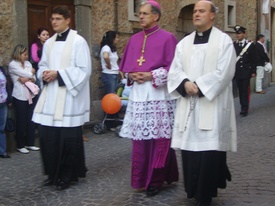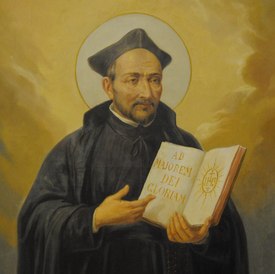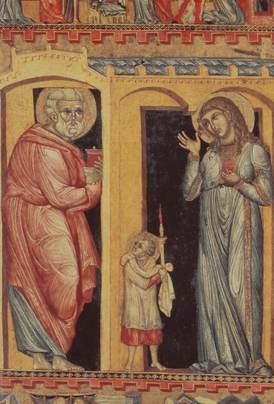 My primary education was with Vincentian Fathers in New Haven, CT. They were great men, hardworking, faithful and interesting. But the one thing missing was that they never spoke of Saint Vincent de Paul, their order’s founder. More than 25 years later I lament this fact because I am now seeing a terrific richness and beauty of the man and saint, Vincent de Paul. A new video has been produced, “Vincent de Paul: Charity’s Saint.” It gives us a wonderful introduction into the heart of a man who has touched many facets of our life in the Church and in the US.
My primary education was with Vincentian Fathers in New Haven, CT. They were great men, hardworking, faithful and interesting. But the one thing missing was that they never spoke of Saint Vincent de Paul, their order’s founder. More than 25 years later I lament this fact because I am now seeing a terrific richness and beauty of the man and saint, Vincent de Paul. A new video has been produced, “Vincent de Paul: Charity’s Saint.” It gives us a wonderful introduction into the heart of a man who has touched many facets of our life in the Church and in the US.
Category: Spiritual Life
Don’t let your words contradict your actions, St Augustine tells us
I am not sure you read the Office of Readings in the Divine Office, and if you don’t may I suggest that you begin; the readings from the Church Fathers is rich for meditation. The Liturgy, Mass AND the Divine Office is the daily magisterium for our faith. Today, the Church proposes a a sermon by Saint Augustine of Hippo, a portion of larger piece actually, titled “Sing to the Lord a new song.” Augustine says SO much worth chewing on, and so I find it difficult pointing out from the text only one item.
a new song; his praise is in the assembly of the saints. We are urged to sing a
new song to the Lord, as new men who have learned a new song. A song is a thing
of joy; more profoundly, it is a thing of love. Anyone, therefore, who has
learned to love the new life has learned to sing a new song, and the new song
reminds us of our new life. The new man, the new song, the new covenant, all
belong to the one kingdom of God, and so the new man will sing a new song and will
belong to the new covenant.
the question is, what to love. The psalms do not tell us not to love, but to
choose the object of our love. But how can we choose unless we are first
chosen? We cannot love unless someone has loved us first. Listen to the apostle
John: We love him, because he first loved us. The source of man’s love for God
can only be found in the fact that God loved him first. He has given us himself
as the object of our love, and he has also given us its source. What this source
is you may learn more clearly from the apostle Paul who tells us: The love of
God has been poured into our hearts. This love is not something we generate
ourselves; it comes to us through the Holy Spirit who has been given to us.
we have such an assurance, then, let us love God with the love he has given us.
As John tells us more fully: God is love, and whoever dwells in love dwells in
God, and God in him. It is not enough to say: Love is from God. Which of us
would dare to pronounce the words of Scripture: God is love? He alone could say
it who knew what it was to have God dwelling within him. God offers us a short
route to the possession of himself. He cries out: Love me and you will have me
for you would be unable to love me if you did not possess me already.
brothers and sons, fruit of the true faith and holy seed of heaven, all you who
have been born again in Christ and whose life is from above, listen to me; or
rather, listen to the Holy Spirit saying through me: Sing to the Lord a new
song. Look, you tell me, I am singing. Yes indeed, you are singing; you are
singing clearly, I can hear you. But make sure that your life does not
contradict your words. Sing with your voices, your hearts, your lips and your
lives: Sing to the Lord a new song.
of him whom you love, but you ask me how to sing his praises. You have heard
the words: Sing to the Lord a new song, and you wish to know what praises to
sing. The answer is: His praise is in the assembly of the saints; it is in the
singers themselves. If you desire to praise him, then live what you express.
Live good lives, and you yourselves will be his praise.
CCL 42, 424-426)
Fr Luigi Squarcia who united his suffering with Christ’s, meets the Lord
 Last November I posted a story about a priest, Father Luigi Squarcia, 66, a priest of the Diocese of Viterbo, who was living with Lou Gehrig’s Disease relating that Father Luigi was determined not to be defined by the ravages of a disease, nor to give into the nihilism of sickness and forthcoming death. What he did was remarkable: Father Luigi lived as a true Christian. He gathered up his sufferings for the life of the Mystical Body of the Church and gave them to the Lord in the person of Pope Benedict.
Last November I posted a story about a priest, Father Luigi Squarcia, 66, a priest of the Diocese of Viterbo, who was living with Lou Gehrig’s Disease relating that Father Luigi was determined not to be defined by the ravages of a disease, nor to give into the nihilism of sickness and forthcoming death. What he did was remarkable: Father Luigi lived as a true Christian. He gathered up his sufferings for the life of the Mystical Body of the Church and gave them to the Lord in the person of Pope Benedict.
Novena to Saint Joseph
March 19 is the solemnity of the Saint Joseph, husband of Blessed Virgin Mary. Time has gotten away from me and I am only now able to post a set of novena prayers to Saint Joseph. This solemn feast is a special feast and one that should not get away from us because of Saint Joseph’s special care for the Church and personally for each one of us. While the days prior to the feast won’t constitute nine days of prayer, perhaps this year we could begin the novena on the feast itself and next year start on March 10. These prayers were sent to me a kind Canadian reader of the Communio blog.
The daily novena prayer Saint Joseph
Remember, most
pure spouse of Mary, ever Virgin, my loving protector, Saint Joseph, that no
one ever had recourse to your protection or asked for your aid without
obtaining relief. Confiding, therefore, in your goodness, I come before you and
humbly implore you. Despise not my petitions, foster-father of the Redeemer,
but graciously receive them. Amen
Day 1
O Saint
Joseph, Pillar of Families! Foster Father of Jesus, protect our families from
the sufferings of separation and divorce. Be a lighthouse for fathers and
father-figures alike, so that they may lead virtuous lives and be good role models
to our children. Amen.
Our Father, Hail Mary, Glory Be [these three prayers are to be said each day after the novena prayer]
Day 2
O Saint Joseph, Guardian of Virgins! Loving, chaste
spouse of our Blessed Mother, protect the chastity of marriages so that our
children may grow up in strong united families. We also ask you to protect the virginity
of the youth so that they may be spared from unnecessary sufferings, and to
help those living the consecrated life to be ever more faithful to their
vocations. Amen.
Day 3
O Saint Joseph, Patron of the Unborn! Your faith was necessary
to bring about the glory of the incarnation. Teach us all to have unbending confidence
in the promises of Christ. May we submit ourselves wholeheartedly to His will
and trust that His providence will see us through in difficult moments. Amen.
Day 4
O
Saint Joseph, Terror of Demons! Help us defeat our untamed passions, imaginations
and memories. Teach us to listen to the voice of our Father in the silence of
our hearts, and give us the strength to have dominion over our senses. In times
of weakness, may we closely depend on our intellect and will, and most importantly
the graces generously given to us through prayer by our Lord Jesus Christ.
Amen.
Day 5
O Saint Joseph, Hope of the sick and the dying. Heal us from our bodily ills,
emotional troubles and worldly fears. Be with us in times of frailty, and
comfort us with hope in eternal life. May our hearts be anchored in Jesus every
day of our lives and may we never be separated from him. Amen.
Day 6
O Saint Joseph,
Patron of the Church! Protect the intentions of our Holy Father Pope Benedict
XVI, our Cardinals, Bishops, priests and all religious who work faithfully to
shepherd the people. Keep them away from temptation, and deliver them from all
unholy and corrupting influences. May our Church remain free from all contagion
of error and be constantly reinvigorated by the Holy Spirit. Amen.
Day 7
O Saint
Joseph, Patron of Workers! Comfort us during the desolation of unemployment,
and bring compassion into our hearts during times of prosperity. Teach us the
right paths and the right words, so that we may be able to meet our temporal
needs. We also ask that you keep our hearts aflame with the Word of God, that
we may always be conscious that our need for daily bread is not restricted to
bread alone, but Jesus in the Eucharist. Amen.
Day 8
O Saint Joseph, Lover of
Poverty! Solace of the wretched! Be our friend in time of suffering, and help
us appreciate the virtues we can harvest through struggle and sacrifice. Keep
us away from the snares of pride and self-importance. Let us remember the
poverty of our Lord so that we can dutifully imitate his life in humility and
obedience. Amen.
Day 9
O Saint Joseph, humble, poor, and obedient servant of the God
the Father! We praise you participation in the glory of the Incarnation, as faster
father of Jesus Christ and most chaste spouse of the Blessed Virgin Mary. Keep
us all close to your heart, and may the faithful works of Blessed Brother André
continue to bring glory to God for years to come. May all those who seek your
intercession and his be met with expedient relief or consolation. Amen.
Teen suicide: how do we cope?
The tragic death of Michael Blosil, 18, son of Marie Osmond, the other day brings light to the sad reality of teen suicide. Noted by friends and family of the Osmonds, Michael had been battling the demons of depression.
Practice prayer … it’ll be the best thing you’ve ever done (as least lately)
Practice prayer from the beginning. Paint your house
with the colors of modesty and humility. Make it radiant with the light of
justice. Decorate it with the finest gold leaf of good deeds. Adorn it with the
walls and stones of faith and generosity. Crown it with the pinnacle of prayer.
In this way, you will make it a perfect dwelling place for the Lord. You will
be able to receive him as in a splendid palace, and through His grace you will
already possess Him, His image enthroned in the temple of your spirit.
Chrysostom, homily read at Office of Readings, Friday after Ash Wednesday
Sin is in opposition to God’s infinite holiness
I went to confession the other day. I try to go once a month and for the most part I make that commitment. For some reason, it was a about 8 weeks since I darkened the confessional. I was leaving that afternoon for my hermitage day (spoken of in another blog post below) and Lent was fast approaching. Going to confession was awkward, lonely, fearful BUT intensely gratifying, freeing, and loving. Facing one’s sinful nature is NEVER easy; it is NEVER anything but a hassle, it is NEVER anything but embarassing but it is the only way I know how to be honest with myself in front of God. As an Opus Dei priest tells me when I see him occasionally for confession: you’ve got sin, I’ve got the grace for you to live … by the ministry of the Church. Of course, this priest is echoing the notion that I am not confessing my sinful self to him personally (I really don’t think he cares one-way-or-another truely in the best sense) but ipse Christus –to Christ Himself. I read the passage noted below from a rather famous spiritual treatise today and the last line from sacred Scripture struck me: If anyone would come after me, let him deny himself. Do you have a clear understanding of mortal sin? Have you gone to confession? How is your struggle with sin going in the face of grace?
Only mortal sin is completely opposed to God; this opposition is so great that it separates the soul from God. However, every sin, even venial sin, and every fault and imperfection, is in opposition to God’s infinite holiness. Therefore Jesus offers the perfection of his heavenly Father as a norm for our Christian life, and engages us in an intense struggle against sin in order to destroy in us its deepest roots and even its slightest traces.
This is what Jesus teaches in these few short words: deny yourself. We must deny self with all its imperfect habits and inclinations; and we must do so continually. Such a task is fatiguing and painful, but it is indispensable if we wish to attain sanctity. Jesus says: The gate is narrow and the way is hard that leads to life, and those who find it are few (Mt.
In echo of Jesus, all the masters of the spiritual life insist strongly on detachment and self-renunciation as the indispensable foundation of the spiritual life.
But first and foremost, it is Jesus, the divine Teacher, who has pointed out to us the absolute necessity of passing through this way: If anyone would come after me, let him deny himself (Mt.
Divine Intimacy
Leading the soul to God by the method of the Ignatian Spiritual Exercises
I came across this entry in an old encyclopedia. In its brevity a lot of truth is revealed: we can work (asceticism) by reason, and the heart, to union with God. Consider for a second what the author, Fr Drum, has to teach. Also, remember that Ignatian spirituality is not the same as Jesuit spirituality. The two are not the same by any stretch of the imagination. Fr Drum tells us that it is possible through prayer and good spiritual direction to know, love and serve God in this world so as to do the same in the next. Many people today don’t have the confidence that knowing and loving and serving God is possible at all. Some don’t know that God wants our happiness today –in this life–that there is meaning to our life that includes suffering and love (& joy) and some reject the notion that we are oriented toward a final goal. Christians call this goal heaven, the Beatific vision, communion with the Trinity, etc. What else is there for the Christian who really prays and lives his or her life with the Gospel and with reason? I get the sense that they don’t have the certainty that God knows us personally and intimately, never mind having a relationship with bodiless being.
I spent many years being formed by Ignatian Spirituality. My personal, cultural, ecclesial life (taken as a unity) is informed by what Saint Ignatius of Loyola proposed in his Spiritual Exercises. But I would not be telling the whole truth if I didn’t say that other influences have had a strong influence in how I look at my life and life’s work today. My life intersects with Monsignor Luigi Giussani, Chiara Lubich, Saint Josemaria Escriva, Saints Francis & Dominic and Saint Benedict and this school of the Lord’s service. The host of women saints and blesseds are too cumbersome to note here. The point, however, is not my interpretative lens except to say that I have benefited from the Spiritual Exercises and perhaps you might think the same if you gave the Exercises a chance. They are clearly an apostolic method in the spiritual life with an incredibly strong contemplative aspect. The Exercises are not for everyone, so be patient with them if you attempt to do an Ignatian retreat.
Ultimately, what the author of this entry names as the goal of the Christian life is my own, regardless of the influences: To live is Christ. It is entirely consistent with the motto of my coat of arms seen above: sequela Christi (to follow Christ). Ignatius (and the other spiritual masters noted above) could not conceive of life any differently. Would that be the same for all people!
The entry:
The spirit of Saint Ignatius was Pauline, — intrepid yet tender; motivated by two great principles,–love of Jesus Christ and zeal for the salvation of souls. These two principles were brought together in his motto: A. M. D. G., “Omnia ad Majorem Dei Gloriam” (All for the greater glory of God). It was this spirit, which breathed in “The Spiritual Exercises,” a method of asceticism, that is the very soul of the constitutions and activities of the Society of Jesus.
This little book is said to have converted more souls than it contains letters.
Certainly the results it has produced down the centuries cannot be exaggerated. The importance of its method is proved by the mere fact that 292 Jesuit writers have commented on the whole work. The purpose of the Exercises is definite and scientific upbuilding of the reason, will and emotions, by meditation and contemplation on the fundamental principles of the spiritual life and by other exercises of the soul. First, God is rated rightly as the soul’s end and object.
Reason is convinced that God is the end for which the soul is created, and all things else are only means to bring the soul to God; hence it follows that that is good which leads the soul Godward, and that is evil which leads the soul awayward from God.
The soul’s awaywardness from God results in sin; so sin is studied both in itself and in its consequences to the soul. Secondly, Jesus Christ is put in His place in the soul, by meditations on His ideals and contemplations on His private and public life.
The soul now aspires to the very height of enthusiastic and personal love to Him; and to the most self-sacrificing generosity in following the evangelical counsels.
Thirdly, the high resolves of the soul are confirmed by the imitation of Christ in His passion. Lastly, the soul rises to a sublime and unselfish joy, purely because of the glory of its risen Lord; and leaps with rapturous exultation into the realms of unselfish and perfect love of God, such as Saint Paul evinced when he cried out: “To me, to live is Christ; to die were gain” (Philippians 1, 21).
Fr Walter Drum, SJ
The Encyclopedia Americana, 1919
Prayer to Saint Agatha
Prayer to Saint Agatha
O glorious Saint Agatha, through whose intercession in Christ I hope for the restored health of body and soul hasten to lead me to the true Good, God alone. By your intercession O blessed Agatha, may I ever enjoy your protection by faithfully witnessing to Christ. You invite all who come to you to enjoy the treasure of communion with the Holy Trinity. Moreover, if it be for God’s greater glory and the good of my person, please intercede for me with the request of [mention request here].
Saint Agatha, you found favor with God by your chastity and by your courage in suffering death for the gospel. Teach me how to suffer with cheerfulness, uniting myself to Christ crucified with a simplicity and purity of heart. Amen.
Saint Agatha, eloquent witness of Jesus Christ as Savior, pray for us.
Saint Agatha, the martyr who says to Jesus, “possess all that I am,” pray for us.
Saint Agatha, concerned with the welfare of all God’s children, pray for us.
Saint Agatha, pray for us.
The Church observes the liturgical memorial of Saint Agatha on February 5th each year by offering the Sacrifice of the Mass and the Divine Office with the Sacrament of Anointing of the Sick for those living with diseases of the breast. The imprimatur for this prayer is given by Henry J. Mansell, Archbishop of Hartford, 2007. Copyright © Paul A. Zalonski.
Praying for what God wants


